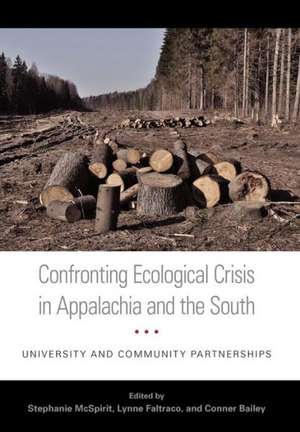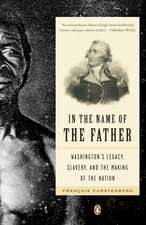Confronting Ecological Crisis in Appalachia and the South
Editat de Conner Bailey, Lynne Faltraco, Stephanie McSpiriten Limba Engleză Hardback – 28 iun 2012
Preț: 464.18 lei
Nou
Puncte Express: 696
Preț estimativ în valută:
88.84€ • 92.60$ • 73.96£
88.84€ • 92.60$ • 73.96£
Carte tipărită la comandă
Livrare economică 06-20 ianuarie 25
Preluare comenzi: 021 569.72.76
Specificații
ISBN-13: 9780813136196
ISBN-10: 0813136199
Pagini: 269
Dimensiuni: 155 x 231 x 28 mm
Greutate: 0.7 kg
Editura: University Press of Kentucky
ISBN-10: 0813136199
Pagini: 269
Dimensiuni: 155 x 231 x 28 mm
Greutate: 0.7 kg
Editura: University Press of Kentucky
Notă biografică
Stephanie McSpirit Stephanie McSpirit is a Professor of Sociology at Eastern Kentucky and has been on faculty member there since 1995. McSpirit teaches classes in statistics, introductory sociology, environmental sociology, animal studies and community-based research methods. She has worked with teams of students on research projects related to environmental and water quality issues in Appalachia and throughout the state of Kentucky and has published her research in various academic journals such as the Journal of Appalachian Studies, Southern Rural Sociology and International Journal of Society and Natural Resources.Lynne Faltraco Lynne Faltraco's involvement as a community activist and organizer began in 1995. She has been the Program Coordinator for the Concerned Citizens of Rutherford County (CCRC) and was awarded a Rockefeller Humanities Fellowship to the University of Kentucky and completed "Bridging the Gap: A Resource Manual for Local Rural Communities." This Fellowship was the beginning of this book project. She has spoken at public hearings, town hall meetings, and conferences such as the Southeast Rural Sociological Conference, conducted classes at various universities throughout the Southeast and given presentations in local communities from Alabama to Pennsylvania. She has written and been featured in numerous articles, editorials, magazines, book reviews and regulatory publications such as the Department of Environment and Natural Resources (DENR) and EPA Region IV's Performance Partnership Agreement. Conner Bailey Conner Bailey is a Professor of Rural Sociology at Auburn University, where he has worked since 1985. Bailey's work focuses on the sociology of natural resources and the environment and has been working on the connection between forestry and quality of life in the southeastern United States for twenty years. He also has been involved with citizen activist groups fighting solid and hazardous waste facilities in the region and related to this to research on environmental justice. Internationally, Bailey has had a long commitment to research on coastal aquaculture and marine fisheries. He has published in a variety of academic journals, including Rural Sociology, Society & Natural Resources, Marine Policy, the Journal of Development Studies, and World Development.Sherry Cable Sherry Cable's primary research interests are environmental conflict, environmental inequalities, and environmental policy. Forthcoming from Temple University Press is her book, Sustainable Failures: Environmental Policy and Democracy in a Petro-dependent World. Recent articles include: "Risk society and contested illness: the case of nuclear weapons workers" (American Sociological Review) with Tom Shriver and Tamara Mix; and "Mining for conflict and staking claims: contested illness at the Tar Creek Superfund site" (Sociological Inquiry) with Tom Shriver and Dennis Kennedy. Cable received the 2011 Allan Schnaiberg Outstanding Publication Award from the American Sociological Association. She is currently working with Donald W. Hastings on a book manuscript, The Shaping of Pre-industrial Societies by Economic Activities: Classical Athens, Classical/Imperial Rome, and Medieval Britain.Shaunna Scott Shaunna Scott is an Associate Professor of Sociology at the University of Kentucky, where she has worked since 1990. She is the former President of the Appalachian Studies Association and Director of Appalachian Studies at U.K. She currently serves as Director of Graduate Studies in Sociology. Her research, which focuses on class, gender, politics, and the environment in Appalachia, has been published in American Ethnologist, Qualitative Sociology, Rural Sociology, Action Research, Appalachian Journal, and Journal of Appalachian Studies.Roy Silver Roy Silver has been a Professor of Sociology at Southeast Kentucky Community and Technical College since 1989. He teaches Introductory Sociology, Sociology of the Community and Modern Social Problems and works with students to develop community-based research projects. From his Harlan County, Central Appalachian Coal Fields home, he continues to work in partnership with other members of his community in a number of community development initiatives and many grassroots citizen groups. Sharon Hardesty Sharon Hardesty is a Lecturer in Sociology at Eastern Kentucky University where she teaches courses in introductory sociology, social problems, community, and research methods. She has worked on several student/faculty research projects in Kentucky and West Virginia.Patrick Carter-North Patrick Carter-North graduated from EKU with a BA in Sociology in 2003. His work with the Martin County project led him to Auburn University, where he completed his Master's Thesis on watershed management and received a MS in Rural Sociology in 2005. He currently resides in Portland, OR. Mark Grayson Mark Grayson received his degree in Political Science from Eastern Kentucky University and taught Social Studies in Martin County, Kentucky until his retirement. While teaching middle school, Grayson also published and edited several weekly newspapers and was editor/ publisher of the award winning Martin County SUN from 1992 and 2001. Grayson was awarded the Honorary Doctor of Law degree from EKU in 2005 for his work in journalism and education as well as protecting the environment. He continues to work as a journalist/ editor and publisher of the now online Levisa Lazer. Nina McCoy Nina McCoy is a 28 year veteran Biology teacher at Sheldon Clark High School in Martin County, Kentucky. Her greatest passions are environmental justice and educating young people. She and her husband Mickey continue to lobby and protest against Mountaintop Removal Coal mining and for environmental protection for the Appalachian Mountains she loves so dearly.Robert Gipe Robert Gipe is a professor of Humanities at Southeast Kentucky Community & Technical College, where he is director of the Appalachian Program. He coordinates a variety of community arts projects in Harlan County, Kentucky, and holds a masters in American Studies from the University of Massachusetts at Amherst. He is originally from Kingsport, Tennessee and formerly worked at Appalshop, a media arts center in Whitesburg, Kentucky.Mansoureh Tajik Mansoureh Tajik is a faculty in the School of Health and Environment, Department of Community Health and Sustainability, University of Massachusetts at Lowell. She focuses on environmental health and justice, geographic assessment, and media literacy. She has an integrated approach to teaching, research, and service through participatory student education and community-based participatory research.Suzanne Marshall Suzanne Marshall is an independent scholar, currently residing in Danville, Virginia, who previously taught at Jacksonville State University in Alabama where she was Professor of History teaching courses in Environmental History. She was Environmental Justice Chair for the Alabama Chapter of the Sierra Club, Chair of Serving Alabama's Future Environment, and a member of the Chemical Weapons Working Group. She has published articles and a book, We're just Trying To Save your Water, Lord, an environmental history in the South. Rufus Kinney Rufus Kinney, a native of Birmingham, Alabama, attended Washington & Lee University and earned an M.A. in English from the University of Montevallo. He taught composition, literature, and speech at Jacksonville State University from 1984 until his retirement in 2008. He is a longtime activist in environmental issues and in 2002 received from the Alabama Chapter of the Sierra Club the Coosa Pit Bull Award "for outstanding work for environmental justice and human health." He has an abiding interest in, among other things, Celtic history and culture as well as Hinduism and Eastern philosophy.Antoinnette Hudson Antoinnette Hudson has been an instructor of history at Jacksonville State University, Jacksonville, Alabama, since 2003; she teaches classes in American and Alabama History and is currently doing oral historical research on African-American veterans of World War II. She has given speeches at conferences on topics ranging from "African-American Soldiers and the Civil War" to "The Endangerment of Chemical Waste on the African-American community of Anniston, Alabama."Robert Futrell Robert Futrell is a Professor of Sociology at the University of Nevada, Las Vegas. His research specialties cover social movements, environmental sociology, sociology of science and technology, and sustainability. He has published widely on science and technological controversy, chemical weapons activism, the U.S., white power movement, and environmental sustainability in the American Southwest. He is co-author with Pete Simi of the book, American Swastika: Inside the White Power Movement's Hidden Spaces of Hate.Richard Futrell Richard Futrell is professor emeritus from Eastern Kentucky University where he taught Sociology from 1974 to 2005. He now lives with his wife Janet at Egrets' Cove, a small eco-village east of Berea, Kentucky. He currently has two writing projects, one is tentatively titled Crossroads Classroom, and the other Pragmatic Local Sociology, A Workbook. He spends much of his time on household projects, gardens, and project around Egrets' Cove.Alan Banks Alan Banks is Professor of Sociology and Director of the Center for Appalachian Studies at Eastern Kentucky University. He teaches courses in Appalachian studies and has written several essays about social change in Appalachia for regional journals and books. Alan lives near the Kentucky River in a house he built with his wife, Pat Banks.Alice Jones Alice Jones is the director of the Eastern Kentucky Environmental Research Institute and a professor of geography at Eastern Kentucky University. Her 18 years of teaching, research, and applied community service has centered on the relationship between land use and water quality in both urban and rural landscapes. Since 2006, Jones has spearheaded and supervised the "Big Dip" community-based sampling project in Eastern Kentucky -- a diagnostic sampling of DO, pH, conductivity, and iron from more than 1600 first-order headwater streams in eastern Kentucky. Anne Blakeney Anne Blakeney is an Eastern Kentucky University Professor Emerita. For 26 years, until her retirement in 2009, she directed graduate students in research exploring the impact of environmental degradation upon the health and daily lives of people in the coal fields. In 2005, The American Occupational Therapy Association recognized her work with the Lindy Boggs Award for "Significant Contributions to Occupational Justice for the People of Appalachia."Betsy Taylor Betsy Taylor is a cultural anthropologist who has worked in many projects for community-driven, integrated, sustainable development and participatory action research in Appalachia and India -- including health, agriculture, forestry, culture and environmental stewardship. She is co-author (with Herbert Reid) of Recovering the Commons: Democracy, Place, and Global Justice, and is currently Research Scientist in the Dept. of Religion and Culture at Virginia Tech. At the University of Kentucky, she served as Co-Director of Environmental Studies, Research Director for the Appalachian Center and on the faculty of the Social Theory program.Ana Isla Ana Isla is an Associate Professor of Sociology and Women's Studies at Brock University, Canada. She teaches Contemporary Social Theories, Feminist Theories, Gender and Society, Women and Development. Isla is currently conducting research in two areas: an exploration of Subsistence Economies in the Peruvian Rainforest, and Canadian Mining in Latin America. She serves as a Board Member for both Canadian Woman Studies and Capitalism Nature Socialism journals.









